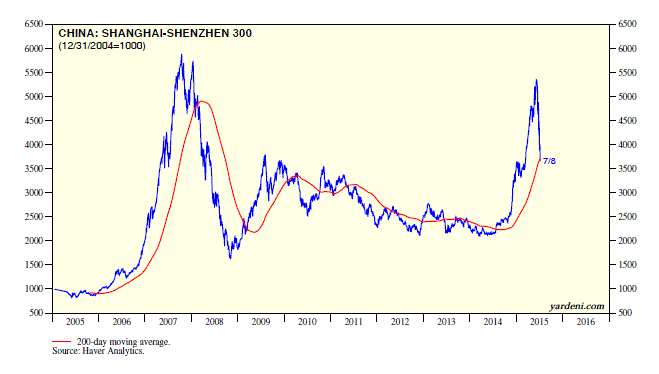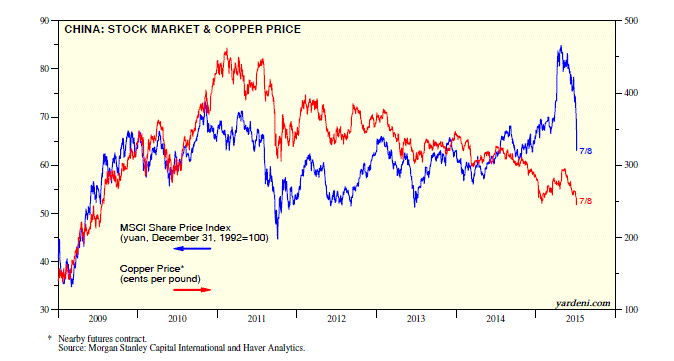
The Chinese may have set a record for inflating a huge stock market bubble in the shortest period of time. It started last year on November 21, when the PBOC cut interest rates for the first time in two years. It did so to revive economic growth. Instead, investors and speculators piled into the stock market. At the beginning of February, the PBOC lowered bank reserve requirements. Effective March 2, the PBOC cut interest rates for the second time in three months. On March 5, the PBOC lowered the rates it charges commercial lenders on a special short-term lending tool.
The Shanghai-Shenzhen 300 stock price index soared 107% from November 21 through this year’s peak on June 8. It has plunged 32% since then. Even the less volatile China MSCI stock price index (in yuan) jumped 35% from November 21 through April 27. It has plunged 21% since then, retracing most of the rally. In the past, this index was highly correlated with the price of copper, which failed to confirm the recent ascent in Chinese stock prices. Instead, the nearby futures price of copper remained near its lowest reading since July 2009.
The latest moves by Chinese officials to prop up stock prices certainly won’t revive confidence in China’s stock market. Why would anyone want to invest in a market where the government can ban selling?
Yesterday, Bloomberg reported:
“China’s securities regulator banned major shareholders, corporate executives and directors from selling stakes in listed companies for six months, its latest effort to stop the nation’s $3.5 trillion stock-market rout. Investors with stakes exceeding 5 percent must maintain their positions, the China Securities Regulatory Commission said in a statement. The rule is intended to guard capital-market stability amid an ‘unreasonable plunge’ in share prices, the CSRC said.”
Regulators have introduced market-boosting measures almost every night over the past several days, as the following selected timeline shows:
6/25: PBOC injects cash into the financial markets.
6/27: PBOC cuts interest rates and lets banks lend more money.
7/1: Investors allowed to put up real assets as collateral to buy stocks.
7/2: Stock manipulation will be investigated.
7/4: IPOs suspended.
7/4: People’s Daily urged investors to stay calm.
7/4: Twenty-one brokerage firms will invest $19 billion in a stock market fund.
7/7: Trading suspended in more than 1,300 companies.
7/8: State-run companies ordered to maintain holdings in listed units.
The stock market meltdown and the inept official attempts to stop the rout could weaken confidence in the government’s ability to manage the economy, which has been slowing significantly. A slew of June data will be released in the next few days. May’s indicators were uniformly weak. For example, electricity output over the past 12 months through May was up just 3.5% y/y, the slowest pace since October 2009.
Today's Morning Briefing: The Confidence Game. (1) The first and second mandates. (2) The third mandate. (3) The credibility challenge. (4) Chinese set a record in the history of bubbles. (5) Roundtrip. (6) Banning selling is a dumb desperate measure. (7) Market-boosting measures failing to boost market. (8) Draghi running out of W-I-T. (9) Japanese exports are weak. (10) Fed needs to reload its gun. (11) “Stay Home” outperforming “Go Global.”

